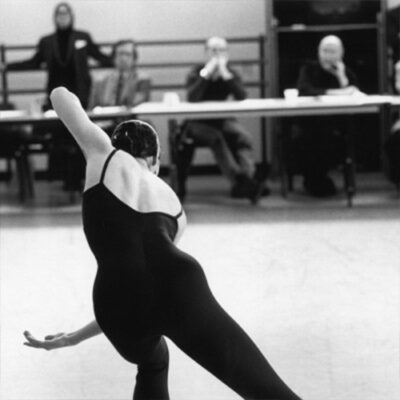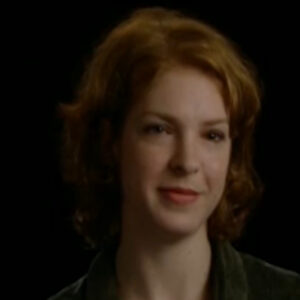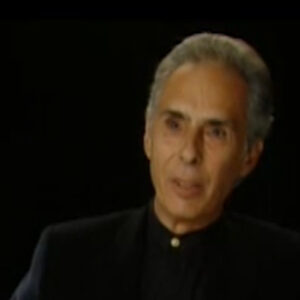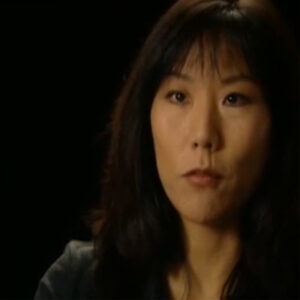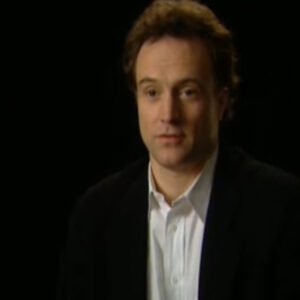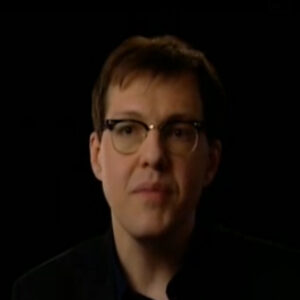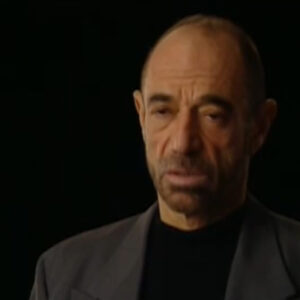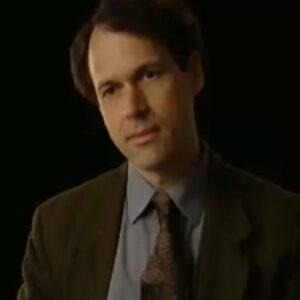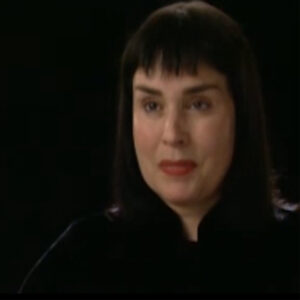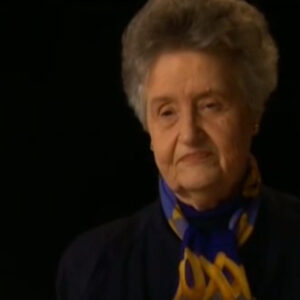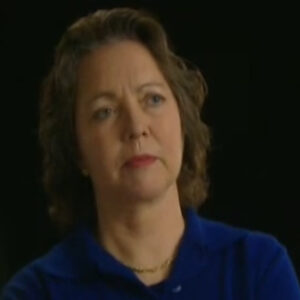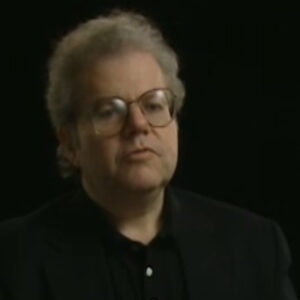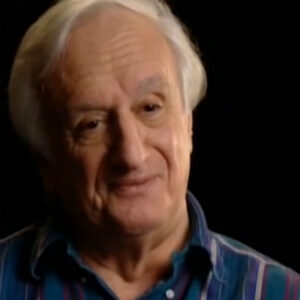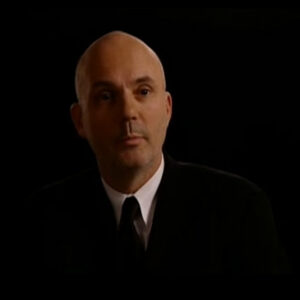Speaker Well, I came to New York in 1931 when I graduated from high school in Portland, Maine. I came to be. My ambition was to be an accountant. But when I went to St. John’s University, they wouldn’t accept me because they work with Regis in Maine. We had points. So I was going to go back to Boston and go to school up there. In the meantime, was took some lessons from the very famous Max Horsburgh, who was the greatest teacher in the world. And he told me that I have talent that I should go to. It’s a sort of musical art. He will give me get me a scholarship. So I think, well, I’ll try it for one year. If I don’t like it, I can always go to Possin, but I stay there for four years and I went right from there and into the Philharmonic.
Speaker That was the way I got started at the school.
Speaker So tell me what the Music Institute of Music. Tell me about your audition at the Institute of Musical Art. What was it like to get in there? How did you do that?
Speaker Well, it wasn’t so difficult in those days to get in because, see, we’re only four trumpet players in the whole school was very small and we just couldn’t play some scales and things they could tell. They needed us, really. Whereas today the audition at the Juilliard is tremendously difficult. They have 90 to 100 applicants and only take four. So I just played a solo. Frank Damrosch had enough time. He listened to all of us. He was the founder and I got in all scholarship. This was not a depression. Tuition was two hundred dollars, which nobody paid because nobody had the money. It was a very wonderful time. And then the that was the year that the Juilliard building was erected at a six storey building. It was an annex to the Manhattan school. Is the a musical art was separated by long corridor. And we’re at the institute. We’re not allowed to cross that corridor. But both schools had a symphony orchestra. Oh, by the way, the Juilliard was a graduate school with just four strings, piano and voice, no brass or woodwind. So when they had this symphony orchestra. So this is where the first year they haven’t started yet. We were recruited to play in the orchestra. So we had both Orchestras Institute and the Juilliard, which kept us busy practically all week. And it was that great training that I had with these two orchestras that allowed me to join the Philharmonic without an apprenticeship going through it. A smaller symphony orchestra, which is usually way is done. So I joined the Philharmonic in 1935, stayed there for 38 years. They told me is going to be a steady job. I didn’t believe them. So a year later, I joined the faculty at the institute because my beloved teacher, Max Flyspeck, passed away.
Speaker And we had about they had to teach some of my former students. My my classmates. So that’s the way I got started at the school.
Speaker And if we go back a little. Tell me a little bit about about Frank Damrosch. What did you know about him? He has. He was from this very musical family. What kind of man was.
Speaker He was a wonderful man. Very, very father like. And he was a brother, Walter Damrosch. And his father was Leopold, who started the scholar and taught him in New York. He introduced the Beethoven’s Fifth Symphony that have New York audiences and no Scio and Frank Damrosch. He wrote a very. He had a very strict school, but he was very benevolent. He had to wear neckties in jackets or sweaters, no sweaters like that to today or Jungreis. And they didn’t have lockers in those days. We had a great underground floor. They had a tremendously large room where everybody gathered to hang the clothes up. But he was wonderful. He listened to all the examinations. He’s very strict, but very kind. When I graduated from high school, you know, I had to give you a nickname. They called me Damrosch. So I showed him with a picture I was gonna bring it into to show you. But I couldn’t find it has been so many years. But when I showed it to him, he says, why are you a member of the family? It was very nice.
Speaker What was the environment of the school like at that time? You were saying for it? It was very small. It was. It was during. She was the school very. I mean, how were people getting meeting and having lunch in the cafeteria? Were we friends, people that played other instruments? What was what was the social life of the school like? I know you met your very pretty wife there.
Speaker Yeah, well, it was a very old school. The building was a very old school with paneled walls. And you felt like you were going back into history. So if you’re going to meet Beethoven had that atmosphere, if you didn’t get that in more schools, the cafeteria was on the ground floor, by the way. We had meal tickets. We didn’t have to pay for just a few of us. You say it in the Depression when money was very scarce and I received fifty dollars a month to live on, which was a lot of money. But there was one big families, a school small enough that, you know, everybody should start like today with the huge enrollment’s.
Speaker I think the enrollment was maybe a few hundred and it was very a very warm feeling. I met this clarinet player there and they were just singing La Prad. And the third year that I was in school. We were married. We rented an apartment on Claremont Avenue for thirty five dollars a month. And there was a fairly famous freshman on 110 Street called the Brass Rail. We eat there every night. Thirty five senses of the meal. A full meal was a great time of my life. I enjoyed. It was the best years of my life.
Speaker Tell me a little bit about the when you when the Juilliard Institute of Musical Art and the Juilliard Graduate School ultimately came together. Did this did the school change much then? Did you did you see a lot of differences when they when once they join together?
Speaker Well, I didn’t, because you see, the first year that the school opened after the inaugural concert, which was a conductor, Leopold Stokowski, myself and Izzy Black and a few of us, we were practically there at the ground floor. We played with the orchestra. So we had the full access to the school. The other students who were not yet employed in the orchestra, they had a temperature, a different feeling. And so but I would know what that really was because I was actually a member of the Juilliard Show as I was concerned, because I played in the opera orchestra and the symphony. We had a very wonderful conductor help us, Stessel. He was a great benefactor of my an awful lot for me. It took us so we had a summer home at the Juilliard up at Chautauqua was an eight week season. It was probably the best orchestra in the world because all the first men from the different symphonies were anxious to go. Did you hear this eight week season on a wonderful lake with pay that our concertmaster was Misha Michika of was the concertmaster Toscanini and every first man in the orchestra like BRF from Philadelphia, Lamay, the great cellist, all these great men. And they were in the trumpet section. We had the greatest trumpet player in the world. Cost of hiim. He was there. He showed us how to do things. It was a great time. Be inside. We’re getting paid good money far. And then we also had a week in Worcester, Mass. The first week in October with a five hundred voice chorus. That was every year. All that has disappeared now, I imagine is still have a Chautauqua, but it’s not affiliated with the Juilliard. The biggest affiliation at the Juilliard had was with the Metropolitan Opera, because they are all the great singers went down here, member Reesha Stevens, that caliber. And but I always felt I was a member there cheering up because I was there, the ground floor.
Speaker I had access to the practice rooms and I could go and come, as I felt like.
Speaker And when did you when did you decide to go to you know, you had been a student all those years.
Speaker But when did you decide and how did it come about that you became a teacher as well because you left Juilliard for the Philharmonic. But when did you come back to to teach? How did that happen?
Speaker Well, it’s traditional with the schools in New York to this day. If you’re in a philharmonic, you usually teach at the schools. See, the whole faculty of Juilliard is members of the Philharmonic. The first of all, the horns, the trumpets and woodwinds and not so much the violence, but the woodwind and brass are members of the Philharmonic. Traditional in every city in the United States, like the full of dog Philadelphia Orchestra teachers at Curtis and Chicago Orchestra, teachers at Northwestern, because you see they they get somebody who is so well represented in the symphonic field. I must say, because things have changed somewhat in the educational field. Jobs are so scarce today that the method of teaching is different. You. When I went to school at the exam, we used to present the symphonic pieces. Now they think they want concertos studies. They form Quint’s sets and they they they have high hopes for a recital career, which doesn’t make sense.
Speaker See it? I would say in my day there were only two conservatories where these students could get an education. Today, every university has a music department and they put up thousands of students and there are only so many jobs, you see. So we estimated one time there were about 10000 quintets in the United States. Brass would win a violin because they have a way to express themselves, to say. I always recommend that my students get a teaching degree as an insurance. And I hold up to some time, like in Portland, Maine, with a degree, a teaching degree you can teach in a high school or the university.
Speaker You play any orchestra and you can get all the pupils will come flock to you. That’s a wonderful life. And you don’t have the worries of playing in a big city, like we call it, the Philharmonic, the hot seat. It’s really. We also call it the graveyard of the conductors because it’s a it’s a detention is great. You don’t have that in a small town.
Speaker Say so with a lot of tension with being the first.
Speaker Tremendous tension. See, we used to play for most orchestras in the country, play two concerts a week. We play for a fourth concert was broadcast internationally. So if something happened the first night, you had to live the next two days till you got on the on the air. The tension was enormous, but it didn’t get any easier. It got worse as it got over.
Speaker Tell me a little bit about teaching at Juilliard. When you first started teaching there, what do you what year was it when you first began? What was the school? What was it like? What what were your early students like? What was the day like for you teaching there?
Speaker Well, I used to work about well, after the war, I was different sort of before the war. I had a full schedule by Thursday afternoon. We had a rehearsal Thursday morning and a concert Thursday night. So most of us used to teach Thursday afternoon so we wouldn’t have to go home and come back for the same day. So we all left out of town and the teaching in those days, because we got all our material from from Paris, all the books came from Paris. I don’t know why, but they find us. Ernest Hutcherson When I took the exam to be had, he complained about the American colonies soles. He said there weren’t adequate for there for Julia. So he arranged for the Paris Conservatory to send us their repertoire of 200 solos with Legitimates. You say they wanted the run of the mill cornet solos, but most of these have great books that we thought from as a boy disappearing because this stuff so much focus on a symphony. It’s a brilliant solo playing because of the lack of jobs and the exams that I took for four years. I had to demonstrate my ability to play in the orchestra with the literature of the orchestra. Today, they play concertos, which doesn’t mean that much won’t get them a job in a symphony, but it’s it’s a hard life. They had a much harder life today than I had as a student because with four students at the school, we had the run of the school.
Speaker And what was it, like you said, after the war? How did Juilliard change after the war? I mean, I know a lot of the student body change. You see a lot of change.
Speaker Oh, tremendous.
Speaker I think now we go back up the line. That’s clear.
Speaker When the war brought out a lot of change. The war brought a lot of changes. Good talent was drafted into the army, you know. But after the war, was there a regular deluge that came in 68, I remember, came in with money in their pockets because the G.I. Bill of Rights was started and they gave the students cash, which was a big mistake that was corrected right away.
Speaker So we had to had too many teachers that were to take care of all these students. And I was teaching a one time between the Philharmonic and it’s a teaching career. I was working Sundays even to try to get that in. So we finally had to get to the point where we gave 45 minute lessons instead of one hour. They were entitled to one hour lesson. But in order to get them all in, we’d give them 45 minutes each. And it was very hard. What saved the situation for a lot of the students? See, this was during the tremendous the worst recession was the WPA was a work program started by Roosevelt and his work students would get together and paid by this. Organizations could go to every school and give children conscious. Walter Damrosch was Frank Brother was the leading figure of the musical world. He had a 200 piece orchestra that I he had drafted a few of us from the school because of his brother affiliation. And we used to play at the Madison Square Garden to an audience of 20000. We would give the concert version Wally Faulknerian operas, all the operas, not so much the concert version, but the concerts Shrake concert, but the opera version. And we used to say, well, most of them came in to stay out of a few of them came in for the music. But this was quite a blessing for the students. You say they helped them to sing school. A lot of them had to drop out because of the money shortage of money that they had scholarships. But you still had to live. You say their folks couldn’t send him any money. You never know from day to day where you’re going to be.
Speaker We can imagine the tragedy of the depression in this country. It was awful.
Speaker I mean, I were looking at the newspaper clippings and we saw that the first Juilliard student who was killed during the Second World War was on a. Was killed in Pearl Harbor. Is playing in the band in Pearl Harbor. Alex. Was a student of yours.
Speaker He was my pupil. He had my trumpet. I gave him a trumpet. Well, who was he? Well, he was a he lived in Astoria when he was a student. Mine. I got him a chance to go into the Navy school in Washington so he could go into a good band. But they needed him. He went on the Arizona as a ship, Arizona. And his roommate on the boat was a friend of a pupil of mine, also from Maine, who kept in touch with me. And it seems that one Sunday morning of the set during the attack, they were tied up with the Nevada. I think it was the ship the Arizona was on. Who else on the outside. So they got on shore. Nagel forgot something. It’s told my friend Boyd, I’m going back and get something in. And she went in there. A bomb dropped off and killed him. And he still match. And the water I went up there when we went to Hawaii. I’m not there. I paid my respects to him. You know, he was a wonderful. But I made after that I never signed a letter of recommendation. I get letters to this day asking me for recommendations for the Army bands and the different organizations to see.
Speaker I always refused to write a recommendation because of that incident, because I felt that I was responsible in a way because destiny has its own way of straightening things out.
Speaker He was one of the first, but I think they were entirely different.
Speaker Now, of course, the real fine students would go up to West Point and get in the band up there because you see, they were exempt from all of their duties. High in the Philharmonic. I was exempt. I was to a classification of Douai because we were considered necessary to the morale. We used to play all the Fort Dix and all the different places around in. A lot of my colleagues, you know, would look at us or cut us off for being in a band where they had to serve in the army.
Speaker So just just for the purpose of me putting together what you’re talking about, can you actually help me that using his name?
Speaker Alex Neidl was with the first was the first student from Juilliard who died during the war. Is that true?
Speaker As far as I know? Yes. Sorry, I can’t I don’t remember. It may have been because I know all of the students that came in after that. I brought Johnny where he was in the army. He was one of my students and Katala, who was my great student.
Speaker He was in the Boston Symphony for years. He teaches at Rice University now. And many of them, you see in my whole career, I had almost 2000 students in 60 years. Some of them attraction’s. Some of them permanent. Some of them came in just to get the my name on their resume, a different things. But I have listed as a home two thousand names. I have a photograph of myself that I usually give to my friends and students with all the names listed in the back.
Speaker So if I can keep it, I have to get a special cameras. I was a special friend so they could see size.
Speaker So tell me a little bit, how did this goal change for you over the years? I mean, it was it must’ve changed a lot. I mean, what was your what was it like in teaching in Juilliard after the war in the 1950s and 60s?
Speaker Well, as I said before, I hadn’t actually changed. I mean, it just changed. And the concept of what the students their future was going to be like, I told them that they just could to study strictly music. They had to get some insurance and that was a teaching degree. Now, I have countless studies now that I see all the time.
Speaker We go out, have dinner, most of them are retired and they have three great pensions. One, my pupils. He and his wife. Between them, they get eighty thousand dollars a year pension. Now, as an orchestral man, it doesn’t happen. You see, I stayed in the orchestra 38 years. Phil Smith is there now, 21 years. And he’s very young. You’ll be there at least 25 more years. So if anybody’s waiting for him to retire, there’ll be an old man at the time. And there are only so many orchestras in his country. However, every small town has a local orchestra that pays Nazeem. The symphony in Portland, Maine, is one hundred years old. Anderson, it’s a professional orchestra now. So if that would be wonderful town for a musician to live in, to play in the orchestra teacher called the college. There’s several colleges right now and a lot of students. That’s the ideal life. That’s the only change. See, only the four trumpet players that were at the Institute of Musical out when I was there. We all wind up with good jobs. I wanted to the metropolitan James Smith was my colleague. He was at my philharmonic. With me is the blank with the first trumpet of the Metropolitan. Inside foil was the first way. So for her is the head of the act, the skill that New Yorkers see. So it doesn’t go into the music business. He was a fine trumpet player, though. But he saw fit to go into the theatrical world. But an actual changing schools, I would say it’s in the literature that the teachers say they’re teaching, did a different literature today.
Speaker It’s a different concept of playing. Some of the books that I used to teach from and studied at disappeared from the map. There were actually two difficult see the books that they coming out now? Much easier than when I went to school.
Speaker And what was it like when when Juilliard moved from player one Javani?
Speaker That must’ve been a pretty big shift when you when you went down to Lincoln Center.
Speaker Well, in a way, of course, it’s. It’s just like going from three room apartment to a 10 room apartment.
Speaker It was a much closer that philharmonic. I could walk right across the street. That’s the only thing that was done. No change as far as I was concerned, except that the rooms were much more modern.
Speaker We had the air condition, which it didn’t have up at the old school. Yeah, a lot of conveniences. This was a modern building, has a had a wonderful library and a great cafeteria. Everything was different. It’s much bigger, of course. The Institute of Musical Art was very small, but very friendly.
Speaker Could see nobody knew each other. It’s a huge school, Julia. You don’t always hear that. At the Institute of Musical, every old gathered together. Everybody I knew, all the teachers that had at that age, you know, Juilliard kept many, many more teachers, of course. Maybe I would say five times as many. It’s hard to know them all.
Speaker There’s only one interesting thing I could tell you a story. We had a great teacher, Miss Longy. She was world famous for solfeggio. Solfeggio means the singing of the actual music that you hear. She was a very well famous, but she had a an impediment. She couldn’t walk. She had a wheelchair downstairs for her when she’d come. She lived at the Ansonia. She’d come to the school and get in a wheelchair in the elevator, take up stairs. And during the first meeting, the first year, we had a general meeting. She says she spoke very French. She says, I have to go just to see ladies wrong. Is easy for me to go downstairs to take a cab and Sonja to let us talk to the ladies room.
Speaker The score is very large. It’s takes her whole block of you. You’ve been there because it’s. It’s two separate schools, actually. The same on one side. It’s on the other tremendously large. And they have a lot of the difference was for the students have a tremendous amount of practice rooms, which is very important. You see, the students can practice. Usually when I was a student, I couldn’t practice at home, so I had to stay at the school late at night. And sometimes during the war I used to teach, they had what you call a raid wardens. You never heard of that. Of course, during the war, they were men. Volunteers would walk the streets to see that every body’s lights were invisible is a shade. So if I taught, say, after six o’clock and if I forgot to put the shade down award and come into the school and say, put down the shade because so worried about an air raid you see from. Thank God it never happened. But that’s the only difference. But that’s actually a different city. The change over from the school, as far as I was concerned, the same students and just their ambitions were different. That’s all.
Speaker Well, tell me a little bit about that, several of your students. I mean, you know, Phillip Smith is still teaching now was a student of yours.
Speaker Yes. Well, I could tell usually from the very first lesson how good they were.
Speaker Phyllis Smith, Phil Spencer was a tremendous talent. And I had so many first Franklin I met I was Mel Broils, absolutely fantastic, because for every one out of four usually world beaters, Mel Broils and I went my solace, I could tell right away from the first lesson. You see, you know who’s going to make it? You make it big. And I think I have pupils in every orchestra in the world someplace, you know, to have the stamp of the Juilliard. It’s a great honor. It opens up and opens a lot of doors. You know, if you call for a dietician, would you go? I’m from Julia. That means a lot. Helps.
Speaker What was what was Wynton Marsalis like as a student?
Speaker Well, he should. Tremendous talent. We were very close. And he he became famous almost before he left the school.
Speaker And he is what is recognized right away. He gained his success very early, whereas the others after he graduated.
Speaker You’ve said it several times, it’s a different world now.
Speaker So, you know, there’s and it’s Philip Smith is going to sit in his orchestra seat for, you know. Thirty five years. Forty five years. You know, nobody’s gonna get that seat. That’s right.
Speaker Same to fall in Chicago. Just celebrate his fiftieth anniversary 50 years and then took the Clowery play. You’re going to have him up your first clarinet.
Speaker Oh, should I choose 50 years. Isn’t the Philharmonic. The oldest member that they’ve ever had?
Speaker Well, tell me about your audition for the Philharmonic when you when you left Juilliard. What what were your options? What were you thinking?
Speaker Well, I don’t know anything. I had no idea what life was gonna be like until it all happened one day. And my Onir. Oh, yeah. Yeah, well, I went down to take the audition at the Metropolitan and miss the man theater manager who know me, of course, because I was playing around town already. And he asked me to play this very six notes from the Rosenkavalier, which are very difficult because up high you wanted love. He said, Why do you have the job? He says, I know who says you remember. So I say, this was on a Monday. I had an audition with Toscanini of the Philharmonic the same day, which I said, Well, I’m not gonna go since I have a job, but I was married. My wife says, you’ve got to go. It’s impolite. They ask invited you. Doesn’t look right because we’ve only two applicants. Me and Lloyd Davidson and. Well, I went up there. So what Toscanini asked me to play three notes from Lumiere, the political. I played him beautifully. Says all right. He said he was broken. English is upstairs. Lloyd Davidson came down when I came down a second time. He says to me, Lemaire, I figured, well, something’s wrong. I don’t know what’s wrong. I couldn’t. I started to get real nervous. Have I played it well? He says in his broken English upstairs. Well, the first time I came downstairs, he says, Lumiere. Well, by this time I was a nervous wreck. I still played it well. I found out later that the man I was replacing is the missile. So the manager came to me and says, You’re a member of the club. His words. I said, Mr. Van Prague, I can’t take the job I just took. The Metropolitan said, we’ll go down to speak to someone, see what it’s like to lose. Mr Mathieu was a very religious man. And he says, Vuk, yanno, says take the Philharmonic is a better job than this one. And God bless you. That’s how I wound up the Philharmonic. But the Philharmonic audition was only two of us. The loser was gonna go to Cleveland. So we were able to guarantee the job when I took the Philharmonic. So. So I got the job today. The audition is something you have to send in a tape and the Philharmonic and the Boston Symphony usually have over 200 tapes that they have to listen to. And the Philharmonic took them two years to find the first trumpet lately. This is the fourth. It’s a different life.
Speaker So tell a little bit about playing trumpet in an orchestral setting. And then when when playing jazz really came into play, you and your students actually, including me, may know your classical repertoire, but they’re really they’re really jazz trumpeter. How does how did that work in your own.
Speaker Well, you see. Well, I taught it quite a few. The list is long, caustic. The only person that can’t cross the line was Miles Davis. No, I mean, when one solace when Marsalis is a fabulous classical trumpet player and a great chance player, but the very few of them can. I don’t really know the when it comes a study with me that real jazz players. But I don’t teach. I just teach them the fundamentals from like the Bible, which we call the Arbon book is the Bible scales in a page, you see. I train them to be legitimate men because I don’t know anything about jazz.
Speaker So they they learn it on their own. So chances are it’s something you can teach anyone. They they pick that up from listening to each other because we hear that. Some of the students at the school when a practicing jazz, I have no idea what they’re doing. I never played jazz state in my life. I’ve never been interested in it. I like it. But I was fortunate never to have to do it to the Philharmonic was the only job I ever had one job my whole life. So I put that we had a lot of good jazz players like Joni Jones, mama miles across. Miles is a great improviser. And Donald Byrd. I give you a list show world. They’re all very famous. But you see, they have a jazz school in Boston. What’s the name of it? I forget the name, it’s just four chairs. They all go up there to study.
Speaker And what was tell me a little bit about Miles Davis as a student. He he came to Juilliard to study with you.
Speaker Yes. He started two years, actually.
Speaker You use his name. Tell me that. Actually, that Miles Davis came. Weird, because my question has his name in it.
Speaker Well, he was just at the time he was famous. You know, he’s a he’s well known. What? He didn’t have the fame that he had when he passed away. What I just taught him like everybody else. So it’s a few things. He was a little eccentric. He wouldn’t sit in a regular chair like you. And I used to sit on his trumpet case and he always had what is a hat trick. Let’s remember, one day I would give him a very simple lesson and the door open. One of his friends walked in and sat right opposite me. Well, on a case like that, what do you do? I just ask him, what do you play? Said I play the clarinet. No, Miles, what is my stopped in the middle of a scale that big deal that I could play. I would take time to finish the scale up to the scale task. Same big deal.
Speaker But he was a great improviser, one of the best. But what is the best chess player recognized now? I think.
Speaker Do you think that in Juilliard, in this sort of musical.
Speaker Whatever the faculty that at the time when people like Miles were at school or even maybe when Whitman was at school, that it was thought well of to play jazz, or do you think that people really at that time were people interested in the kind of thing that Miles wanted to do or not really know?
Speaker Superior Manhattan School of Music has a jazz department which Juilliard doesn’t have, and most of the teachers isn’t. It’s usually not a legitimate symphonic. She only Peacocke, mostly Mozart.
Speaker I must say, one of my most successful students is Sharon Schwartz. You know, the most said he was probably the finest one of my best students. He developed. He wanted to become a conductor beneath the smart thing. I think he’s going places. He’s just got the Liverpool Symphony as well as the one on the West Coast.
Speaker And why was he a great student?
Speaker Very big talents. Tremendous talent. He started studying of Magos, a very young boy. His father was a famous surgeon. His mother’s also a psychiatrist when he used to come to my house from Jersey. And I told his father he was way past. As you know, the question is costing you three thousand dollars. Says, how do you figure that? Well, it takes you an hour to get here. You have to wait for an hour to hit his lesson. You know, to get back. I think you could make a thousand dollars now. It’s seconds. You say he says you’re right.
Speaker And. Very, very conscientious about his children. I mean, very few fathers would do that. Well, not such a like he was, but he had some students have more talent than others, you see. There was a difference.
Speaker I had noticed the difference in teaching. I don’t know if you’d be interested to the here is the Latin students from the Teutonic students. There’s a big difference there in their technical dexterity. See, the Latin students are more flexible with their attack and it’s honey, the flexibility, whereas the Teutonic students, they don’t have the flexibility. But we have a system that they call their tongues a double tongue. So it doesn’t make any difference.
Speaker But in the old days before they invented this, they didn’t have the ability to play the first technique like the Italians or the Frenchman. So that’s the only difference in these stories. See the cause you have.
Speaker Oh, I could go into this. We have heavy students in their life, students. You see different types of students. Some of them.
Speaker But the ambition is a very good teacher is to get them all sound alike. I had a funny thing happen to me in Chicago. Years and years ago during the World’s First World’s Fair. Is he black? My roommate from Chautauqua, we hitchhiked out to Chicago. And like most students, we went to a big music store to practice a little bit. You know, they said we’re going to buy something. But we wanted to practice in a very, very distinguished man walked in. He looked like a duke. He looked at me. He says, you’re a student of Max Schlosberg. I said, well, how was his? You know, in Chicago knows me. Chicago is. How do you know? He says, I recognized the style of his teaching. It was quite a couple of Schlosberg. But he was the manager of the Chicago Symphony. One of the foremost proper place in the world, Lewellen, his name was. Took us out, gave us a DNA and showed us the town is wonderful. But imagine recognizing that where you came from and who you studied with. That’s quite a feat. Schlosberg left a stamp, but all his pupils, you could tell. Usually every teacher has a different style.
Speaker So we could tell by the bridle. It’s different. And said, is that usually it’s the chairman’s style.
Speaker This is a German style. Musically, it’s a German country. It’s the oldest symphonies, a Germanic. At the Boston Symphony is strictly French. Most of the old days was changed now. But when I was a boy, the whole orchestra was French.
Speaker And in Chicago, they were all Germans. Cincinnati and the New York Philharmonic was mostly Polish and Russians. The Metropolitan Opera star was all of minutes from the opera. I say it’s quite clannish.
Speaker And house and, you know, even even in the students at Juilliard, you know, originally when when Frank Damrosch really wanted to start the conservatory at the Institute of Musical Art, he he went abroad looking for.
Speaker He really wanted to create a European style conservatory, I think. And now that’s changed quite a bit. You know, a lot of students are foreign.
Speaker Well, yes.
Speaker Well, as you see, this is before their plan. And all the students at my my era were for local from Connecticut. And the majority were from New Jersey. Believe it or not. And very few from Maine has too far away. And Boston head to New York and New England Conservatory. So they all went there, but very. I had one student came in much later from California. I remember that.
Speaker But mostly local. And Jersey had the majority of the students. Most of the money was there. The Philharmonic members of mostly lived in New Jersey, all of them. The only reason I did live in Jersey, because my sister lived in Brooklyn, I still visit her, I say. But otherwise I would have better chose you to say. Have a seat. The ones who don’t live in the apartments on Broadway. Live in Jersey.
Speaker And now, of course, it’s very different students from Korea and Taiwan.
Speaker Well, there’s tremendous amount of Asians who have a say, roughly 35 percent.
Speaker That’s a lot because I have always been preaching the fact. You see it, the French horn sort of monopolized by the girls. All the women in a lot orchestra cycle are women and they monopolize the woodwind. So 50 years from now, it will be hard to find a male musician. So it’s like the nursing industry. Years ago, you had male nurses, but now they’re all women. It’s gonna be the same way. One woman could say much better equipped for the music, the violin. They’ve got a better hand for the brass instruments woodwind. They can turn faster than we can. Everything is in their favor. Let’s see. The Philharmonic, when I joined, they have no women. Now they’re 37. The first oboe is our first flute. Woman at the Met. The first horn. First of all, first class. They’re all women. And every time they’re, you know what’s happening in Europe. The Berlin Philharmonic. They would think women for a long time.
Speaker Now, the women started a few more years to become the majority. That’s life. You can’t change it.
Speaker Well, Juilliard was always even that from 1985. It accepted. Women accepted, you know, black students and students from abroad. It was always very I mean, there was never it was always about the music, wasn’t it?
Speaker I mean, that was a nice thing, because in the 50s when people were being treated unfairly, it came much later than, you know.
Speaker I go back to 1935. I would say that wants to move downtown. Things have changed, you say, but in the beginning. But it’s only made lately that the women have invaded the orchestration. And it’s taken over. There was a symphony orchestra in New York. My wife played in it. Antonio Brika is the conductor was all girl. What symphonies? They hope to start an orchestra. They were very successful for quite a while, but fell through sheer. But eventually it’s gonna be.
Speaker It’s all going to change.
Speaker Who are the other? Who are your great friends at Juilliard? Who are the other faculty members that you are friends with? As you taught over the years. You remember some of the other great teachers of the time. Did you. Did you know Dorothy DeLay? People that have been there for many, many years like you?
Speaker Well, there’s always one great teacher who taught most of the students like. It was the greatest flute player of all time. He taught this great man, Kincaide in Philadelphia. Julie Baker, who there now he has all the students until they pass away, you see. And there was a COVA was a great bassoon. He taught all the bassoon with that are alive today and the clarinet.
Speaker Bellison and Labotte oboe player Sansoni is the horn. They’re all outstanding players. Is it cause they’re all gone now? It’s a different generation, but in my time, these are the men whom was Shlosberg and his clock, the trombone. Sansoni was the horn, Shlosberg was the trumpet.
Speaker And I forget the name of a tuba player many years ago.
Speaker But did you know some of the teachers that, you know, these famous sort of pedagogic teachers like Rosita Levine?
Speaker Well, they had a tremendous piano faculty. They were all world famous, great soloists who would come in and go on the road so for 10 weeks and come back and teach the children’s ten lessons in two weeks. Leaving the husband and wife, they were very famous. Then it was Joselo Salata you told me about.
Speaker He was a pupil of list and the great violinist who was a. Was the person who taught you only Manoogian until something happened to him, no. And he went to study with somebody else. And he had quit for a while, but he came back real strong, died recently. Everybody was a very specialized school in those days.
Speaker You see, when five dollars was giving going price and was a for a lesson and these great soloists, you know, is proud to get fifty dollars a lesson. I was a tremendous amount of money. That was Levine Safieh for another lesson.
Speaker He was making 10 times more than he thinks.
Speaker Always worked this way in high school. That’s what you can make a life, for instance, of a vocalist’s a famous vocal teacher can teach a lot of because his students income go, go, go out and make a tremendous amount of money but rati million. Whereas a trumpet student can only make so much understand, it’s like supply and demand. How important your instrument is. No piano soloist. They could command a tremendous fee for playing. So they put in one ear that they taught at the school. They would be sacrificing a lot of the time. Also you say so they had to be paid for that.
Speaker We had a tremendous faculty, very famous piano, especially piano. They had a great vocal teacher. Julie shut down. Her name was. She was a world famous also. People came from Europe to study with her. And because. What’s a name there? Let me. She’s very famous now. She has a run of the school. You might say teacher. Her articulate. Her sisters, a cellist. We’re all students together.
Speaker Really? What was Dorothy like as a student? You never know.
Speaker Just like, oh, you know what? I was like her. She was like tiny. We were all set together on the down on the dining room. You know, nobody special. We didn’t know where we’re going. Oh, what with too many down there who disappeared.
Speaker You know, not everybody became. Well, I a say famous. Some of them went back home and taught school how to get private lessons. It’s a matter of fact, my room my wife’s roommate just passed away last year. I noticed at the magazine. At the school.
Speaker I forget her name is so many years ago about housing that that was a big problem in the school. When I went there, housing, did I tell you this? You see the claim on have you had these apartment houses that were owned by the New York and Columbia University and the professors that they occupied because they had their houses in the suburbs, so they were vacant? Most of these apartments were run by spinsters and they would rent the rooms out towards Stoner’s. And I had a room on 116 Street facing Claremont Avenue.
Speaker It was thirty five dollars a month. And if you want to have dinner there. She was thirty five cents. So that was the housing situation.
Speaker It was sold that way because, you see, travelling was very, very difficult. These students from Jersey had an awful time getting it. So this was the era of the elevator. Second, Ivy oil. You don’t remember her. And then before the I. R t was built. And they still have the rainbow trout. There’s contracts up there by the union. You can still see the real Julia, the conflicts over that policy.
Speaker They’re made for one beautiful feature that they had at the institute that I would love to. They don’t have the Juilliard. They had this tremendous board, not a blackboard.
Speaker It’s about six feet square. You put all the messages so and so. We show for you to call them instruments for sale, chops, groups or grants and all this stuff. You know, you could look them all the information you need. It was posted on the wall. I wish they would do that at the old the Juilliard is very helpful. And then the institute wouldn’t have any department. It was the whole school run by three women, Miss Frank, whose phone home Bussel in the Bursa and George, which was the like the theme, that’s all. We didn’t have the apartment placement bureau. You didn’t have the foreign department. They have so many things that they know. Juilliard is really here. I would say 20 times as large. There’s only one thing that they had at the school was necessary.
Speaker The first year students had to live across the street in the big building was for foreign. She has a name I can’t remember international. That’s if I had to live there for one year before they could rent the room. That was it. I’m glad you remember that. I can remember that.
Speaker I’ve been thinking about it a lot more recently, thinking about figures. When I do all I’ve. I read all these things all day long.
Speaker It’s hard to remember, you know. But I do.
Speaker But. Well, I was. I’m thinking about. Let’s see.
Speaker Can you talk a little bit? I mean, you were telling me that that that that now you you eat supper and you live you sleep in the house of another of another somebody who’s in the family of somebody who is in the orchestra.
Speaker They talk a little bit to me about how, you know, it seems that this life in music is is if you’re describing as being so, so lovely, so collegial, all your. Well, I tell you, it seems like a nice life that you’ve had.
Speaker I tell people that they are the most exclusive club in the United States is possibly the United States Senate. You know, I say take, but I think they’re wrong there because the truly other faculty I’ve been a New York Philharmonic is the most exclusive club goes. They take care of you long after you retire. So we have a special concert for us. Every may know at my age, I was very friendly with these.
Speaker That’s what the drummer, Gus Schmeling’s name was. Now his family live about a mile away from where I live because of their great friendship that he had. They’ve taken me in. So I have a room there. I have my meals. They treat me beautifully. But this is true of all the Philharmonic. We always attend the funerals, you know, when somebody passes away memorials and would stay in touch with each other. We have a certain paper run by Johnny Weir, gives you all the information about everything she like. Last month, a very dear friend of mine, a flute player, passed away and he kept in touch with the family. It’s a very, very warm family feeling that you don’t get out. Otherwise you’re known for playing in different shows or stuff.
Speaker But it hasn’t been. Has it been really has your life in music just been something that you. Do you think it’s a great, great life to have to be a musician?
Speaker Well, everybody has an ambition to be in a great orchestra city. I was very thrilled when I remember I first saw my first contract. I was writing Uptown and they’ll double buses and I was grinning like a shadow cab. People thought, I’m crazy, but I had my contract in my pocket. I’m so happy. I was smiling. It’s it’s a very difficult life. Outside of that. I was my Ash Richie, the violence. They have 60 year violence. So it’s not the pressure is not great enough. But if you play as a solo instrument, the pressure is great, but you would never give it up for any money.
Speaker That’s that’s your life. And the prestige goes with it. Of course, you see, if you told people who plays solo, trumpeter Daniel Philharmonic, they listen to you and they play what you say. Otherwise, they would argue with you. But it’s a very, very few people can attain that, you say. There’s only so many orchestras. I think they started something at the Juilliard last year to acquaint the students with some form of. I don’t know exactly. Maybe when police who comes here can tell you about it.
Speaker What do you what do you think police say or tell me?
Speaker Tell me about how you feel about his school has changed a lot. He’s done more for the school than all the other presidents.
Speaker So wonderful. That being a cross, he looks like a student himself. So young. Look. And his father and I were great friends. As a matter of fact, the night he was born, I was with his father. We went to the hospital. I told Bill this all the time. It gets a kick out of it. But also the same thing that happened with Johnny Corigliano, the concert mass. I went with him to the hospital. And by the way, his son just got an Oscar for writing a best song in here for a movie. I see. It’s quite a family affair. You’ve heard of a shoulder to shoulder where he lived in my neighborhood. I remember hostage taking by the hands of the MP, I think, or looking at all the cars and has got to look back and tell these boys that I know you when his mother ran a dance school. We live very close to his shoulder in Flushing and maybe a mile away. My daughter was I remember her school show.
Speaker And what was what was Joe Police’s father like, Mr.
Speaker Your friend?
Speaker He was also a teacher at Juilliard, you know.
Speaker Yes. Well, he was a great bassoon player. He was he was very Snel, you know, built like a. That’s quite a resemblance, sir. He was he was from Philadelphia. His he was homeless for the Philadelphia and. He and his wife run. Well, he had a she had a school up in Flushing. But he was one of the boys.
Speaker And you were going to tell me I was asking you about the little Irish lady.
Speaker All she was a joy.
Speaker Well, what was her name?
Speaker Nora. Well, she came when the Juilliard started, and she was a, you know, saw that everything was in order, like the towels and. And then as she got older, she was loved so much by the school that they put her in the front desk at the reception. Everybody knew Nora and she was so kind. You would walk by her without kissing her. You know, she fairly insulted if you didn’t. And she stayed there a long time until she became ill.
Speaker She’s a wonderful lady. She was really part of the Juilliard. And I knew her at least 40 years choose to go over the island. She had four sons and she lost her husband an earlier, but she was the most loved woman in the whole school.

